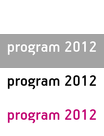| poprzedni | lista | następny |
|
Gazeta Festiwalowa "Na horyzoncie", nr 11
29 lipca 2012
And the Beat Goes On
Ian Haydn Smith Editor, International Film Guide Cinema's relationship with the Beat movement has never always been an easy one. The arrival of Walter Salles' adaptation of 'On the Road', the festival's closing film, may change that. The Beat Generation was a moniker coined by Jack Kerouac in the late-1940s. It identified the sub-culture of youths who were breaking away from the norms of post-war American society. A group of writers who met in New York a few years later would come to be seen as the vanguard of this wave, and the leading literary lights of a new era. The principle figures were Kerouac, William Burroughs and Allen Ginsberg. Their key works are 'On the Road', 'The Naked Lunch' and 'Howl'. Together, they defined an age. On film, the Beats have best been served by non-fiction. There are a plethora of documentaries which explore the writer's relationship with their times. The writers have fared less well in narrative cinema. More often than not, it is the films that have attempted to catch the spirit of the group rather than literal adaptations of their fiction that have worked best. The language, which may have once appeared edgy, can sound contrived. In the case of 'The Subterraneans' (1960) it already seemed out of date. This adaptation of Kerouac's novel assumed that the appearance of real jazz musicians in the cast would add a degree of veracity. But it failed completely in realising the writer's world. More recent adaptations have mingled source texts with the writers' biographies. Cronenberg's 'The Naked Lunch' (1991) is a creditable attempt to filter the novel through the experiences of Burroughs' colourful life, most notably the fatal shooting of his wife. Likewise, in 'Howl' (2010) directors Rob Epstein and Jeffrey Friedman chose to focus on the controversy surrounding the publication of Ginsberg's poem rather than tackle his text. There have been many attempts to film 'On the Road'. Kerouac had wanted Marlon Brando to do it. And for years F. F. Coppola struggled with it. Finally, it came down to Brazilian director Walter Salles to take the challenge on. Best known as the director of the Oscar nominated 'Central Station' (1998), he also directed another famous journey, Che Guevara's 'The Motorcycles Diaries' (2004). Teaming up once again with the co-writer of that film, Jose Rivera, Salles has produced arguably the most faithful adaptation of a Beat novel. Sam Riley plays Kerouac's fictional alter-ego Sal Paradise. Alongside him are Viggo Mortensen and Tom Sturridge, as Burroughs and Ginsberg. However, like the book, the heart of the film is Dean Moriarty, a thinly veiled portrait of Neal Cassidy. His free-flowing, jargon-filled conversation inspired the style of language the Beats adopted. He was their muse, sometime lover and wild at heart. Garrett Headland plays him and it is upon him, not the role call of stars, nor the stunning panoramas of the American heartland, that the success or failure of this film film rests. |
Moje NH
Strona archiwalna 12. edycji (2012 rok)
Przejdź do strony aktualnej edycji festiwalu:
www.nowehoryzonty.pl Nawigator
Lipiec 2012
Szukaj
filmu / reżysera / koncertu
|



















